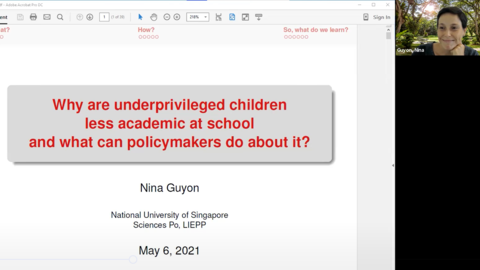Event report
Webinar: Why are underprivileged children less academic at school and what can policy makers do about it?

On this occasion, Nina Guyon, Assistant Professor in the Department of Economics of the National University of Singapore (NUS), IZA Research Fellow and LIEPP (Interdisciplinary Lab for the Evaluation of Public Policies, Sciences-Po) Research Affiliate discussed the economics of education.
It is no secret that students from socially disadvantaged families do less well at school than their socially advantaged counterparts. What can policymakers do about it? To answer this question, one must be able to measure the true causal impact of every educational policy to shed light on the policies that are the most efficient. This is no easy task and governments are just starting to familiarize with rigorous impact evaluation methods. This talk introduced the basic intuition of some of these methods while presenting results on a set of policies covering topics like parental involvement, tracking policies, educational aspirations, violence, and social segregation at school.
Nina Guyon is Assistant Professor at the Department of Economics of the National University of Singapore (NUS). She graduated from the Ecole Polytechnique, received her PhD from the Paris School of Economics and is a Research Affiliate at the “Interdisciplinary Lab for the Evaluation of Public Policies” (LIEPP) of Sciences-Po. Her work uses cutting edge methods such as large-scale randomized control trials and quasi-experimental methods to measure the causal impact of educational policies and has been published in top journals such as the Review of Economic Studies, the Economic Journal, and the Journal of Human Resources.
Enjoy the replay below:


